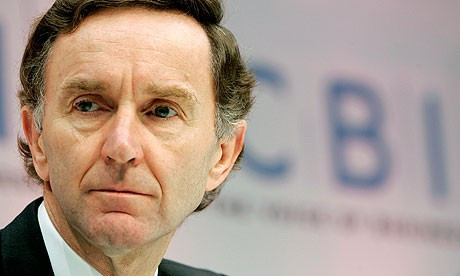UK Trade Minister Lord Green: Government Must 'Step up a Gear' to meet George Osborne's Export Targets

The UK government must "step up a gear" if it is to stand any chance of meeting Chancellor George Osborne's target of doubling the value of exports to £1tn by the end of the decade, trade minister Lord Green has admitted in an exclusive interview with IBTimes UK.
Lord Green also said that "Brand Britain" should be exploited by businesses following the success of the London 2012 Olympic and Paralympic Games, and exporters must not forget about Britain's European trading partners in their pursuit of lucrative emerging markets such as Russia, Brazil and China.
"Growth in trade with the emerging markets remains strong - but we know we have to step up a gear to meet our trade goal," Lord Green said.
"In the Autumn Statement, UK Trade & Investment was given an additional £70m to support UK companies - particularly small and medium sized businesses - with their plans to export and attract the investment they need to grow.
"The new funding will enable us to employ more trade advisors in our regional offices across England, support offshore British Chambers of Commerce to support UK firms to break into new markets and support companies to participate in trade fairs and overseas trade missions.
"Turning the UK's trade deficit around is not going to happen overnight - it is a marathon, not a sprint - but it is a marathon we can complete."
Official figures show the UK's seasonally adjusted trade deficit was £3.6bn (€4.4bn; $5.9bn) in October 2012.
A total of 19 "priority markets" have been highlighted by UKTI for the export opportunities they offer British business - and not one is in the EU, despite the area being the destination for half of all the country's outgoing trade.
The priorities are Brazil, China, Colombia, Egypt, Hong Kong, India, Indonesia, Malaysia, Mexico, Qatar, Russia, Saudi Arabia, Singapore, South Africa, South Korea, Taiwan, Turkey, UAE and Vietnam.
Despite this omission, Lord Green insists British business does not ignore the EU.
"Russia heads the list as our fastest growing major export market, but trade with other emerging nations is also growing strongly," said the Tory peer, whose former company HSBC recently received a $1.9bn fine for letting criminal gangs and terrorists launder money through the bank.
"It is also worth large and small firms alike putting the effort in to finding new or first customers in Europe - despite economic troubles in the Eurozone, it is still a market of half a billion people with some of the highest living standards in the world."
A £1.5bn support package of support for foreign importers of British goods will "enable the UK to compete better with firms from other countries that have equivalent backing from their export credit agencies."
Progress was recently made in Russian export opportunities when a 16-year ban on British beef and lamb, originally imposed because of the BSE "mad cow disease" crisis, was lifted in a move potentially worth £80m.
'Brand Britain'
During the summer months the world fixed its eyes on Britain as the country hosted the London 2012 Olympic and Paralympic Games, as well as the Queen's Diamond Jubilee celebrations.
Reminiscent of the late 1990s "Cool Britannia" phenomenon, the government has embraced the "Brand Britain" concept as it seeks to capitalise on the increased attention on the country following the summer's events with its GREAT campaign.
Under GREAT the government says it wants to highlight reasons to invest in and travel to the UK.
"British businesses are using this global brand to promote their products and services overseas and find new customers, whether in emerging markets or our more established trading partners," said Lord Green.
"In the Autumn Statement the Chancellor announced a further £30m over the next two years to continue the GREAT campaign.
"This expansion of the campaign will enable us to focus on promoting the UK in markets which offer our companies the best opportunities to win new business."
UK Exports and Ethics
As Britain hangs its "open for business" sign on the front door, and with a dire domestic economic situation compounded by a global economic slowdown, the frantic race for trade and growth risks undermining the country's human rights obligations.
Britain has a reputation for questionable arms dealing. In the past, UK firms with the support of the government have sold weapons and violent security goods to regimes in the likes of Libya and Bahrain, where they have been used as tools of oppression against the civilian population.
Saudi Arabia and the UAE are two of the biggest customers for British arms, both autocracies with dismal human rights records.
In 2009 Saudi Arabia killed dozens of civilians in Yemen with an airstrike using Tornado jets that were sold to the government by the UK.
Arms dealing is lucrative and presents significant export opportunities for Britain - at the expense of lives and human rights in many parts of the world.
As such there is an ethical imperative on the government to ensure that as the UK pushes to reach Osborne's £1tn goal it is not to the detriment of populations elsewhere.
"Britain operates the toughest arms export control system in the world. All applications for export licences are assessed on a case-by-case basis against international criteria with consideration of end use and the circumstances prevailing at the time," said Lord Green.
"Respect for human rights and fundamental freedoms are mandatory considerations for all export licence applications. A licence would not be granted if to do so would be a breach of the criteria."
---
Follow @shanecroucher
© Copyright IBTimes 2025. All rights reserved.






















